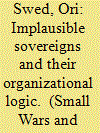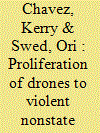|
|
|
Sort Order |
|
|
|
Items / Page
|
|
|
|
|
|
|
| Srl | Item |
| 1 |
ID:
193065


|
|
|
|
|
| Summary/Abstract |
The two decades of war in Afghanistan left a mark on the American armed forces and redefined the American ways of war-making. One of this war’s legacies is the reimagining of the role of private military and security contractors in contemporary warfare. Due to the massive involvement of the private sector in the American war machine, this industry transformed from a marginal participant into a central partner. The privatization of military and security functions became a norm, an integral part of security architecture and military operation. In this study, I provide a brief review of this development and its implications.
|
|
|
|
|
|
|
|
|
|
|
|
|
|
|
|
| 2 |
ID:
183832


|
|
|
|
|
| Summary/Abstract |
Corporate privatization of security has generated a neoliberal iteration of an old profession: the private military contractor. This development has revolutionized security policies across the globe while reviving old patterns of inequality. Following neoliberal logic, outsourcing fosters two types of employment: the exploitative and the exclusive. The first refers to low-status individuals hired en masse to perform menial labor; the second refers to experts who perform functions central to the employer’s mission. We contribute to this discussion by focusing on the qualifications of a different subsample of this industry: American contractors who died while performing military and security functions in Iraq. We assert that such American employees directly engaged in mission-essential combat and security functions better fit the employment category of an exclusive, expert sector at the core of the private military industry.
|
|
|
|
|
|
|
|
|
|
|
|
|
|
|
|
| 3 |
ID:
173750


|
|
|
|
|
| Summary/Abstract |
From an obscure sector synonymous with mercenaryism, the private military and security industry has grown to become a significant complementing instrument in military operations. This rise has brought with it a considerable attention. Researchers have examined the role of private military and security companies in international relations as well as the history of these companies, and, above all, the legal implications of their use in the place of military organizations. As research progresses, a significant gap has become clear. Only a handful of studies have addressed the complex of issues associated with contractors’ demographics and lived experience. This article sheds some light over this lacuna, examining contractors’ demographics using descriptive statistics from an original data set of American and British contractors who died in Iraq between the years 2003 and 2016. The article augments our understanding of an important population of post-Fordist-contracted workforce, those peripheral workers supplementing military activity in high-risk occupations with uncertain long-term outcomes.
|
|
|
|
|
|
|
|
|
|
|
|
|
|
|
|
| 4 |
ID:
173760


|
|
|
|
|
| Summary/Abstract |
The digital divide's implications on health inequality among American Military veterans has been discussed extensively in research; however, it remains unclear what is the association between Internet usage and health specifically among Veterans. We examine this question by addressing the growing digital gaps in the veteran population, looking at the association of Internet use and self-reported health. Using the National Survey of Veterans we find that compared to those who use the Internet daily, those who use the Internet less frequently have significantly higher odds of reporting “fair” or “poor” self-rated health. The significant association remained when demographic, socioeconomic, and military factors were controlled. While our results indicate that veterans that use the Internet more frequently report more favorable self-reported health, given our data we are unable to distinguish a causal relationship. We conclude by discussing potential policy interventions, targeting helping those who are left behind.
|
|
|
|
|
|
|
|
|
|
|
|
|
|
|
|
| 5 |
ID:
192532


|
|
|
|
|
| Summary/Abstract |
Early studies on state drone proliferation argued that it would be temperate, constrained by high financial, technical, and infrastructural requisites and fielded according to the logic of scarce, exquisite airpower. While this rationale has held for limited conflicts, the high attrition and massive demand of a total war compelled strong standing armies to follow a different model of adoption: emulating weaker violent nonstate actors leveraging low-cost commercial platforms. The Russia-Ukraine war has captured this trend. Despite earlier expectations of armies maintaining advanced airpower for strategic ends, underdog Ukraine, followed by Russia have developed heavy reliance on commercial drone technologies for tactical aims. Framing this in military and battlefield innovation literature and drawing on studies on commercial drone use among violent nonstate actors, we argue that this constitutes a new trajectory involving mixed military arsenals enhanced with dual-use commercial platforms.
|
|
|
|
|
|
|
|
|
|
|
|
|
|
|
|
| 6 |
ID:
181957


|
|
|
|
|
| Summary/Abstract |
The havoc and disarray among governments and societies caused by the COVID-19 outbreak also invited opportunities for violent non-state actors to exploit for their advantage governments’ failure to provide an adequate public health response or their denigration of security apparatuses due to the outbreak. Focusing on the early months of the outbreak, this study examines three courses of actions taken by those actors and the potential explanation for the variation in responses. The responses examined are actors offering COVID-related public health response as a surrogate for the state, the extension of hostilities, and the request for a ceasefire. Looking at a sample of 72 groups we suggest that the actors’ governance levels, which dictate their organizational logic and behavior, are strong predictors for the likelihood of them offering public health support, conduct attacks, or pursues a ceasefire during the period examined.
|
|
|
|
|
|
|
|
|
|
|
|
|
|
|
|
| 7 |
ID:
136111


|
|
|
|
|
| Summary/Abstract |
The unique relations between the Israeli-armed forces and the local hi-tech industry have been identified as a strong explanatory variable for the Israeli hi-tech boom. This article highlights the role of the military as a socialization institution in those relations. We identify how the accumulation of “military capital” during military in service contributes to soldiers as veterans and employees in the hi-tech sector. Military service brings with it professional training, social ties, and social codes that influence the composition of the hi-tech workforce and hi-tech industry’s organizational and functional culture. Examination of Israeli hi-tech workers’ profiles reveals not only a very high proportion of military capital amongst the employees but also an institutional preference for those who possess it.
|
|
|
|
|
|
|
|
|
|
|
|
|
|
|
|
| 8 |
ID:
177560


|
|
|
|
|
| Summary/Abstract |
Scholarship on the proliferation of unmanned aerial vehicles (or drones) mainly focuses on states’ use, sidestepping the consequential proliferation of drone technology to violent nonstate actors (VNSAs). Meanwhile, an increasing corpus of media, military, and policy publications underscores the latter’s importance. The source of the gap is that existing proliferation models overlook civilian drone technologies. Applying supply- and demand-side proliferation models, we confirm conventional wisdom that military-grade drones are not likely to proliferate to VNSAs. Including civilian drones inverts proliferation logic across the boards. Shifting from cost-prohibitive, inaccessible, and technically complex military technologies to cheap, simple civilian platforms, we demonstrate that VNSAs have the resources, capacity, and interest to effectively incorporate drone programs to advance their aims. Furthermore, in context of state and nonstate actors’ security environments and normative constraints, the proliferation of civilian drones matters for international security. Norm-abiding states need expensive, high-performance, norm-enabling drones. For norm-defying VNSAs, civilian platforms are sufficient, even efficient, to advance their agendas.
|
|
|
|
|
|
|
|
|
|
|
|
|
|
|
|
|
|
|
|
|